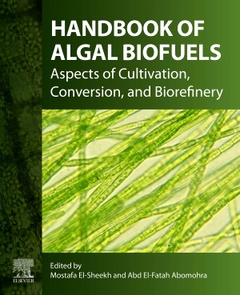Handbook of Algal Biofuels Aspects of Cultivation, Conversion, and Biorefinery
Coordonnateurs : El-Sheekh Mostafa, Abomohra Abd El-Fatah

Handbook of Algal Biofuels: Aspects of Cultivation, Conversion and Biorefinery comprehensively covers the cultivation, harvesting, conversion, and utilization of microalgae and seaweeds for different kinds of biofuels. The book addresses four main topics in the algal biofuel value-chain. First, it explores algal diversity and composition, covering micro- and macroalgal diversity, classification, and composition, their cultivation, biotechnological applications, current use within industry for biofuels and value-added products, and their application in CO2 sequestration, wastewater treatment, and water desalination. Next, the book addresses algal biofuel production, presenting detailed guidelines and protocols for different production routes of biodiesel, biogas, bioethanol, biobutanol, biohydrogen, jet fuel, and thermochemical conversation methods. Then, the authors discuss integrated approaches for enhanced biofuel production. This includes updates on the recent advances, breakthroughs, and challenges of algal biomass utilization as a feedstock for alternative biofuels, process intensification techniques, life cycle analysis, and integrated approaches such as wastewater treatment with CO2 sequestration using cost-effective and eco-friendly techniques. In addition, different routes for waste recycling for enhanced biofuel production are discussed alongside economic analyses. Finally, this book presents case studies for algal biomass and biofuel production including BIQ algae house, Renewable Energy Laboratory project, Aquatic Species Program, and the current status of algal industry for biofuel production.
Handbook of Algal Biofuels offers an all-in-one resource for researchers, graduate students, and industry professionals working in the areas of biofuels and phycology and will be of interest to engineers working in renewable energy, bioenergy, alternative fuels, biotechnology, and chemical engineering. Furthermore, this book includes structured foundational content on algae and algal biofuels for undergraduate and graduate students working in biology and life sciences.
Section 1: Algal Diversity and composition 1. Microalgae: Habitats and classification 2. Global seaweeds diversity 3. Chemical composition of micro- and macro-algae 4. Algal cultivation 5. Genetic manipulation of microalgae for enhanced biotechnological applications 6. Current status of algal industry 7. Algal CO2 sequestration and wastewater treatment 8. Application of halophilic algae for water desalination
Section 2: Algal Biofuel Production 9. Biofuel versus fossil fuel 10. Algae for biodiesel production 11. Algal biogas production 12. Algal Bioethanol and biobutanol production 13. Thermochemical conversion of algal biomass 14. Direct biohydrogen production from algae 15. Algal jet fuel
Section 3: Integrated approaches for enhanced biofuel production 16: Sequential biofuel production for whole biomass conversion 17: Biofuel byproducts recycling towards bioeconomy 18: Using solar radiation for algal culture irradiation 19: Physical stress for enhanced biofuel production 20: Microalgal-bacterial consortia for biomass production and wastewater treatment 21: Process intensification 22: Life cycle assessment 23: Challenges and future perspectives
Section 4: Case studies 24. History and Recent advances of algal biofuel commercialization 25. BIQ algae house, Hamburg, Germany 26. Renewable Energy Laboratory (NREL) 27. Aquatic Species Program (ASP) 28. Algal fuel production by industry
Abd El-Fatah Abomohra is a Professor of Environmental Engineering at Chengdu University, China. He obtained his PhD in 2012 through a cooperation program between Tanta University in Egypt and Hamburg University in Germany funded by DAAD. He has 20 years of teaching and research experience, as he worked as a teaching assistant, assistant lecturer, lecturer, and associate professor at Tanta University, Egypt since 2001. During his career, he has participated in a number of national projects in Egypt, Germany and China for wastewater treatment/CO2 sequestration, water desalination, and biofuel production from different biomass feedstocks. His current research interests include environmental biotechnology, biodiesel production, anaerobic digestion, bioremediation, fermentation, and thermochemical conversion. His research group is primarily working on bioenergy production from different non-edible feedstocks, including algae.
- Provides complete coverage of the biofuel production process, from cultivation to biorefinery
- Includes a detailed discussion of process intensification, lifecycle analysis and biofuel byproducts
- Describes key aspects of algal diversity and composition, including their cultivation, harvesting and advantages over conventional biomass
Date de parution : 12-2021
Ouvrage de 702 p.
19x23.4 cm



